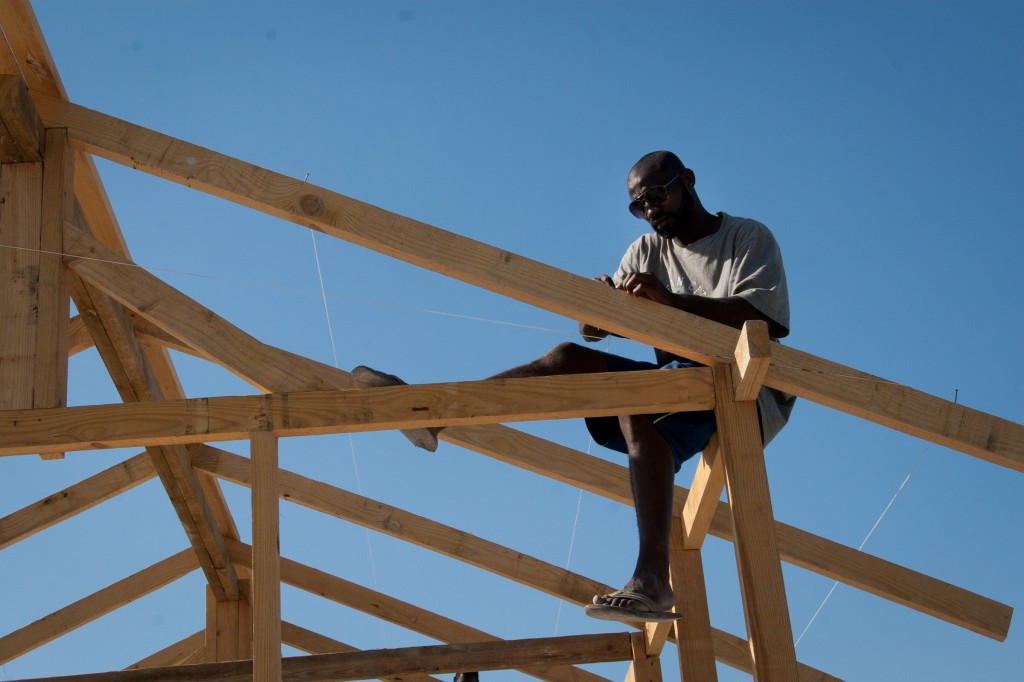Just a small fraction of foreign aid has gone to Haitian businesses, but an NGO network is trying to change that.
PORT-AU-PRINCE, Haiti — Just days after a cholera epidemic began infecting thousands of Haitians in October 2010, Salim Loxley received a phone call at his desk in Port-au-Prince from the United Nations Development Program (UNDP), one of the largest-spending organizations operating in the post-earthquake nation.
“We need 4.5 million bars of soap by Friday,” said the man on the other end, anxious to distribute the soap to Haitians who were living in unsanitary displacement camps and vulnerable to the highly infectious disease.
Read the full story as it appeared at the Global Post.

A man works to build a church roof using locally purchased, foreign-imported wood in the Neret neighborhood of Port-au-Prince. (Jacob Kushner/GlobalPost)
PORT-AU-PRINCE, Haiti — Just days after a cholera epidemic began infecting thousands of Haitians in October 2010, Salim Loxley received a phone call at his desk in Port-au-Prince from the United Nations Development Program (UNDP), one of the largest-spending organizations operating in the post-earthquake nation.
“We need 4.5 million bars of soap by Friday,” said the man on the other end, anxious to distribute the soap to Haitians who were living in unsanitary displacement camps and vulnerable to the highly infectious disease.
Normally such a call would go to one of UNDP’s US-based suppliers, who would truck the soap over from a warehouse in Haiti or ship it down from the States. But, as a director of entrepreneurial NGO called Building Markets at the time, Loxley had a database at his fingertips that included eleven local soap suppliers and three manufacturers who produce soap here in Haiti.
Loxley helped connect UNDP with Fritz Brandt, whose company Carribex has been producing soap, oil and other food products for local consumption in Haiti since 2004.
Carribex was able to produce and begin delivering the special type of soap UNDP needed to slow the cholera epidemic in just two days — so fast, in fact, that UNDP momentarily ran out of space to put it all.
“I started delivering in 72 hours, and finished three million bars in less than a week,” said Brandt, who also helped UNDP identify a recipe for a particular laundry soap that would be more effective than typical bar soap in killing cholera bacteria. “I had to stop delivering because they didn’t have any warehouse to put what they asked for.”
Brandt said the $252,000 soap deal, which was followed shortly by a $600,000 deal with UNICEF, marked the first time in seven years of operating his factory that one of the foreign NGOs or international bodies that spend billions of aid dollars annually on supplies and equipment had ever contracted with him.
The $10.2 billion in aid pledged to post-earthquake reconstruction in Haiti is largely bypassing the nation’s local producers and importers. Only 2.4 percent of the $205 million in aid contracts by the US government in Haiti as of September 2011 went to Haitian companies, according to an analysis by the Center on Economic and Policy Research of the Federal Procurement Database System.
Now in the final weeks of its campaign in Haiti as its own funding runs out, Building Markets is working to get the thousands of other NGOs to send more contracts to local businesses — the first time many of these businesses have had access to foreign NGO dollars.
By investing in local business, Loxley, formerly the organization’s country director, said aid dollars could have a “multiplier effect” — bringing workers into the factories and warehouses of Port-au-Prince and off the crowded streets where hundreds of thousands of vendors hawk imported soap, rice and products in an informal economy.